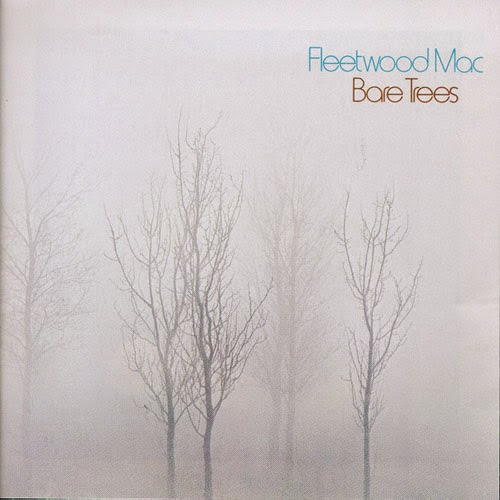Mid-metamorphosis is fascinating. The moment at which someone or something has been transforming from one stage but has not fully arrived at the other finds the subject straddling between two states of being, whether it's a kitten or a puppy halfway through becoming a full-grown cat or dog, or even an actor partially made up for his stage persona. So it was with Fleetwood Mac's 1972 album Bare Trees. The band, having started out as a straight blues group founded by guitarist Peter Green in Britain in the late sixties and, after numerous personnel changes, ended up as a California pop-rock outfit by the mid-seventies, was neither blues nor pop at the time this album was recorded but a blend of both, with touches of various other forms flavoring the group's R&B foundation. The result was astonishing.
Bare Trees finds original members Mick Fleetwood on drums and John McVie on bass backing guitarist Danny Kirwan, who had joined the original Fleetwood Mac quartet as a fifth member, and American guitarist Bob Welch, who had replaced original member Jeremy Spencer (Green was also gone by 1972). Kirwan and Welch invigorated the Mac sound at the time with their fluid, steady performances and spirited singing, while John McVie's then-wife Christine grounded the band with her smoky, warm vocals and her silky piano lines. Bare Trees' themes mostly concern beginnings and ends, particularly from adverse and unsettling situations, with promises of hope and comfort that are only partially fulfilled. The intersection of blues, country, and folk-rock reveals a thrilling sense of adventure all the way through.
The album's explosive opener "Child Of Mine" shows why this band was named for the rhythm section; Fleetwood and John McVie perfectly anchor Kirwan's straightforward vocal and his intense, country-blues guitar sound. Both Kirwan and Welch play economically throughout the record, such as on the title cut and the instrumental "Sunny Side of Heaven," offering carefully crafted, shimmering solos. Welch's own songs bring a touch of American folk to the band's blues base. "The Ghost," a mysterious tale of a foreboding wind storm in the Southwestern desert that's laden with a trippy guitar riff and a flute solo, comes down with the gentleness of a summer breeze and the darkness of a thunderclap, while his tender, haunting ballad "Sentimental Lady" (a re-recorded solo version of which was a hit for him in 1978) expresses a strongly personal level of intimacy that even the band's best songs from its period with Lindsey Buckingham and Stevie Nicks on board can't quite match. Fans of Fleetwood Mac's later incantation who are unfamiliar with this phase of the band's lifespan will no doubt find re-assurance in Christine McVie's compositions, which offer her trademark blue-eyed soul-sister sound, and in noticeably fresh ways. "Homeward Bound" (not to be confused with the Simon and Garfunkel song of the same name) features Welch and Kirwan offering intense guitar lines, but the sprightly keyboard melody and the urgency of Christine's vocals make it plain who's leading the band. She pulls off a mix of Nashville country and Aretha Franklin soul in "Spare Me a Little of Your Love," a ballad that's so inviting you can almost feel yourself in her arms.
Kirwan's brooding persona throughout, be it in his own songs and instrumentals or in his playing on other cuts, join with John McVie's bass undercurrents and Fleetwood's steady beat to keep the intensity on Bare Trees alive and prevent it from sliding into MOR. The tension was perhaps inevitable; Kirwan was an extremely temperamental musician who was prone to reckless behavior, and he left the band after this LP's release. But Bare Trees' evocative song cycle and its ruminations on rebirth and decay (capped by a poem written and read by one Mrs. Scarrott at the end) make for a fine document of a band moving away from the blues and gaining confidence in a more mainstream direction. Not quite mainstream yet, but far from its origins, Fleetwood Mac in 1972 were a band that makes one appreciate that halfway there can be more than half the pleasure.





No comments:
Post a Comment